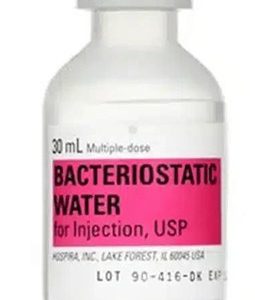-
 Bacteriostatic Water
×
$15.001 × $15.00
Bacteriostatic Water
×
$15.001 × $15.00
$72.00
BPC-157, a lab-made peptide that’s 99% pure, is attracting interest in the research world because of its potential therapeutic benefits.
The Molecular Composition of BPC-157
BPC-157, also known as Body Protection Compound 157, is a peptide created in a lab and is made up of 15 amino acids. Each of these amino acids contributes to the peptide's unique characteristics and potential therapeutic effects. Its specific amino acid sequence is critical for its biological activity, which has been shown in various research studies. The sequence of BPC-157 comes from a protective protein in gastric juice, highlighting its evolutionary importance and the natural biological processes it might affect.
The molecular structure of BPC-157 is crucial to how stable and effective it is. It has a molecular weight of about 1,585 Daltons, and its relatively small size helps it get absorbed by cells. The way the peptide is configured, especially the arrangement of its amino acids, affects how well it binds to target receptors and other molecules in the body. This structural integrity ensures that BPC-157 can maintain its functionality in different conditions, which is very important for research uses.
Each amino acid in BPC-157 contributes different chemical properties, like hydrophobicity and charge, which can influence how the peptide interacts within biological systems. For example, some amino acids improve its ability to dissolve, while others might help it interact with specific cell processes. Understanding these interactions is essential for researchers studying the potential benefits of BPC-157 in tissue healing and protection.
Also, the purity of BPC-157 is highly important for scientific research. Impurities or variations in the peptide can lead to inconsistent results and make it harder to understand how it works. So, getting a high-purity form of BPC-157 is crucial for ensuring research studies on its therapeutic potential are accurate and reproducible.
Because of its molecular composition, BPC-157 remains an interesting subject in peptide research, providing insights into healing processes and recovery mechanisms in biological contexts.
It is important to note that we do not offer any reconstitution information or usage instructions for these products. They are high-quality peptides supplied for research use only. Any requests for this type of information will result in a permanent ban from our store.
You can expect your order to ship Monday through Friday, with the exception of holidays, and potentially even on the same day. We provide free USPS Priority shipping for orders exceeding $200. For those who prefer UPS Ground, that's an option for an additional cost. If you need expedited shipping, please contact our support team to discuss available services. We do not ship internationally.
We don't offer returns due to the delicate nature of our products. You can cancel your order, but you must do so before it ships. Once it's shipped, cancellations are not possible. If you need immediate assistance with questions, want to cancel, or if your order arrives with issues like missing, incorrect, or damaged items, please reach out to us at info@nexusbiolife.com.
We don't offer returns due to the delicate nature of our products. You can cancel your order, but you must do so before it ships. Once it's shipped, cancellations are not possible. If you need immediate assistance with questions, want to cancel, or if your order arrives with issues like missing, incorrect, or damaged items, please reach out to us at info@nexusbiolife.com.
No, we don’t have a physical store location at the moment. We accept only orders through our online shop and we’re shipping all orders with the Swiss Post Service. Please visit our shipping section for more details.
From time to time you will find us at design fairs and popup markets in Switzerland. Subscribe to our newsletter and you’ll receive the latest news.
This is a dehydration process where the peptide (in a solution) is first frozen. Then, the surrounding pressure is reduced, causing the frozen water or solvent in the material to sublimate (go directly from the solid phase to the gas phase), essentially removing the moisture.
Peptides are often unstable in liquid form. Lyophilization significantly improves their stability, making them last longer on the shelf. It makes them easier to transport and store.
When you need to use the peptide, you simply add a liquid back to it (reconstitute it). So, when you see a peptide described as "lyophilized," it means it's in a dry, solid form that was created through this freeze-drying process to make it more stable.